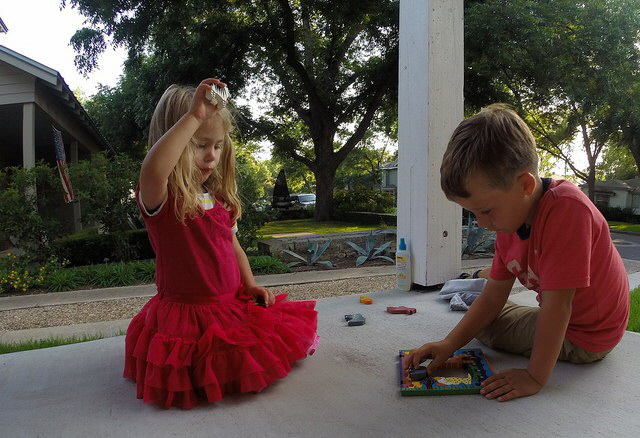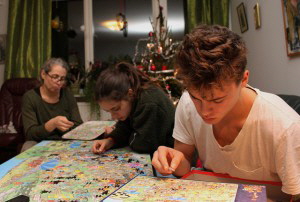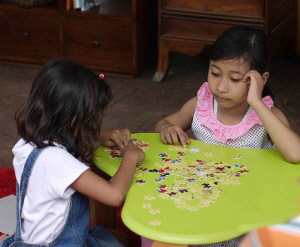|

Puzzles Offer Multiple Benefits for Kids of All Ages
October 9, 2014
Puzzles were a big part of our family vacations. We often spent a part of the summer at a log cabin in the woods and each year we would have a card table in the corner with that year’s jigsaw puzzle on it. Sometimes a single person would be looking for a piece and other times you had to stand over someone’s shoulder because all the chairs were taken. Puzzles are fun and challenging and rewarding and as you will soon discover, offer other benefits too.
- “Puzzles help children build the skills they need to read, write, solve problems, and coordinate their thoughts and actions—all of which they will use in school and beyond.” NAEYCNational Association for the Education of Young Children
Puzzles come in all shapes and sizes and that makes them a versatile toy and learning tool for babies and adults. Babies will start with board puzzles. The pieces and there will only be a few of them, are likely to have knobs on them to make it easier to grab and manipulate the piece. Adult puzzles can have one thousand pieces or more and each piece can be, well, practically tiny. (Can’t count the number or times we were searching the cabin for the missing piece.) Think about the ages and stages of your puzzlers and pick puzzles that are appropriate.
Research shows that working on puzzles improves ones skills in the following areas:
- Social
- Language
- Motor
- Emotional
- Thinking and Reasoning
Social Skills: Remember a time when you were working on a puzzle. A big part of it is working together. Getting all the straightedge pieces and then putting them together for the outside edge.
There’s Cooperation on who works on which part of the puzzle. Changing places. Joint searches for that one last piece to finish the red bird.
Puzzlers offer Encouragement to one another to keep looking, try a different section or break for making a snack.
Team Thinking, planning and accomplishment are happening as the group works toward common goals. Puzzlers learn and use different problem solving skills to get better at finding pieces.
Language Skills: To make the puzzle happen one has to come up will effective ways to communicate. We had our own language to describe the piece we were looking for, “Looking for a mostly blue piece with three outies and an innie”. Puzzlers are sharing ideas, challenges, successes and general conversation around the table.
Motor Skills: Beginners, young children, are using planning skills to figure out how to get a piece out or in. The pieces may be as big as their hands and require some serious negotiating. These are Gross Motor Skills involving bigger muscles. As we get bigger and the puzzles pieces get smaller Fine Motor Skills are what’s needed to manipulate a piece into place. We ‘re using our fingers and manual dexterity to turn pieces over and around and in.
Emotional Skills: This is all sounding too good to be true but think for a minute about your experience with puzzles: most puzzles have only one way of going together. Actually there’s only one place that a piece will fit in the entire puzzle. It’s pretty satisfying to find a piece and ultimately satisfying to finish the puzzle. There’s a Sense of Accomplishment for finding each piece.
And because only one piece will do it takes Persistence.
Goal setting plays a part. Whether there are three pieces or three hundred pieces, puzzles have the inherent ability to motivate participants to “Get the Job Done”. Remembering our vacation puzzles and different people saying, “I’m just going to finish this one star” or “one more piece”.
Concentration or Focused Attention: How amazing are the times when you are so focused on something that time just disappears? Puzzles have a way of putting us in that zone. It’s not uncommon to just disappear for a minute or longer, scanning the table for the piece you are looking for.
Meditation has those same qualities of being focused, relaxed and on task. Puzzling is a great stress reducer reliever. Lower heart rates, less anxiety, sense of well being are all part of doing the puzzle.
- “[The] Brain produces a chemical known as dopamine that is chiefly responsible for learning and memory. The production of this chemical increases in the brain at the time when it is engaged in solving the jigsaw puzzle.” social-psychiatry.com/jigsaw-puzzles-good-brain/
Thinking and Reasoning Skills:
Puzzles offer so many things to consider like size, shape, color, orientation and relationship. Puzzling is all about looking at the pieces that are together and then Inferring that the piece you are looking for must look like. Spatial reasoning, Abstract Thinking and Visualization are required to do that inferring. Work on a puzzle very long and you’ll find yourself in the position of, “I’ve seen that piece” and then trying to remember where you saw it. Memory for younger set is exercised when they try the puzzle again and want to recreate successful strategies or avoid previous mistakes. The child wants to be better at the puzzle than they were the last time.
You can make your own puzzle by pasting a picture to cardboard and then cutting it into shapes.
Young or old puzzling builds and hones skills that make life more fun and you more competent. Maybe it’s time to treat yourself to a new puzzle or dig some of your favorite puzzles out of the closet.
- “Working with table puzzles helps young children develop many skills, such as observing, analyzing, sharing, and solving problems. Puzzles become a significant educational tool in the development of children’s thinking when teachers select puzzles appropriate to children’s developmental levels….” Nancy S. Maldonado
For lots of great information, read all of Ms Maldonado’ article at the Child Care Quarterly here. And look for her upcoming book, Puzzles: A View to Children’s Thinking
|